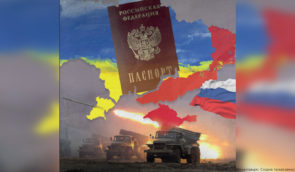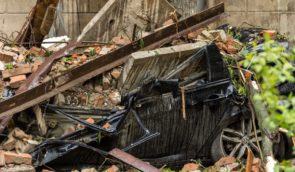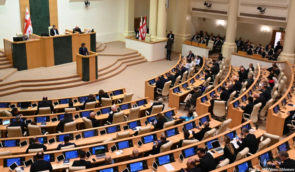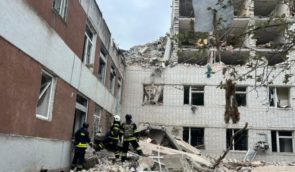Occupation authorities suppresses the Protestant community in Bakhchysarai
Occupation authorities of Crimea have forbidden for Protestant community Golos Nadii (Voice of Hope) to operate in a building it occupies for more than 10 years.
As reported by Rustam Futullayev, paster of the Skinia (Tabernacle) church, in the broadcast of the Hromadske Radio.
“For six months our community was under psychological pressure. At first we were visited by FSB officers, officers from the prosecutor’s office, then visited by firemen – if we have something wrong. And we allocated money to make it right, as they said. Then we got warrant that we can’t operate in the building”, – said Futullayev.
The reasons of such pressure are unknown to pastor: “We can’t understand this. Our men went to local lawyers and local authorities. At the middle level occupation officials say ‘We see no reason it is a violation of law to give you such “paper” but you must address to higher officials’”.
The building of the church in Bakhchysarai is adjacent to the FSB building.
“The building of our community stands in the center of the city. After the occupation FSB building was built at the opposite side of the street. I can’t confirm that their leader said this, but middle tier says ‘You don’t correspond to our religion. We have only one religion, you are interfering and you need to be removed’”, said Futullayev.
According to the pastor, the Skinia church is a member of Golos Nadii: “This is the church of Evangelical Christians of Ukraine, an association, which includes more than 1,500 churches all over Ukraine (before the occupation authorities tried to sever these bonds at least on legal level). In addition, it is our subsidiary community, which we supported”.
During broadcast on the radio Olga Skrypnyk, coordinator of the Crimean Human Rights Group, informed about other instances of persecution of religious organizations in Crimea.
“In 2015, we talked with almost all religious communities that were located in Crimea. The main problem, which was pointed by all communities, is the forced registration. They were forced to undergo registration as religious organizations under Russian law.
It is rough by itself – every community must register, if to pass such registration under Russian law. If it is religious group that Russia does not consider to be traditional, then they need to justify their beliefs under Russian law, apply documents to Moscow and there an examination will be conducted”, – said Skrypnyk.
According to her, the second rough form of persecution is linked to the religious buildings.
“A lot of communities have reported about this problem. A striking example is the situation of the Kyiv Patriarchate when temple of Kyiv Patriarchate in Sevastopol was handed over to Moscow Patriarchate. We talked with the Protestant communities in other cities and they also said that they are regularly visited by FSB officers and they conduct conversations about alleged extremism. Certain communities informed that FSB officers tried to persuade them to give information about worshippers”, – informs Skrypnyk.
As it is known, the Third Committee of the UN General Assembly, which focuses on human rights questions, approved a draft resolution with a critical assessment of human rights situation in the Russian occupied Crimea and Sevastopol city.
The resolution also stresses the need to release illegally detained Ukrainian citizens and cancelation of the decision to ban the Mejlis of the Crimean Tatar People.
The document appeals to Russia to grant international human rights mechanisms an unhindered access to Crimea, especially for the UN Human Rights Monitoring Mission in Ukraine, in order to monitor the human rights situation.







